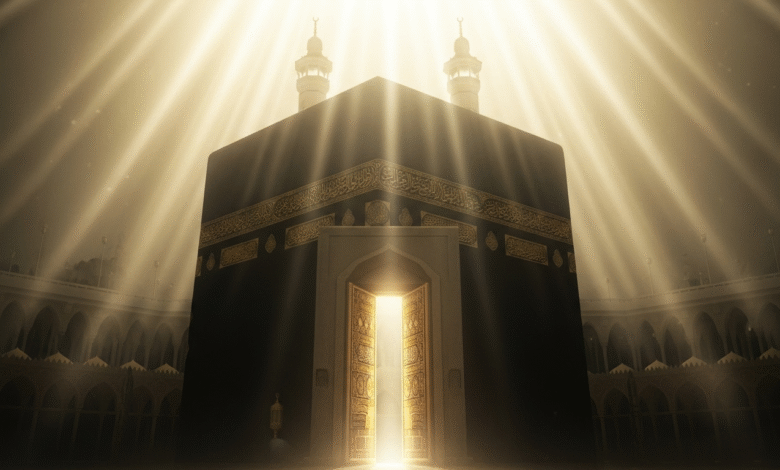Conquest of Mecca: A day of forgiveness and tolerance The return of righteousness without fighting

After many years of persecution and displacement, the Prophet returned with an army of Muslims to conquer Mecca, the sacred country from which they had been unjustly expelled. But this conquest was not a traditional military conquest, but a day of forgiveness and tolerance, a day when human principles and values triumphed before weapons. What were the events of this blessed conquest, and what lessons did it hold?
Breaking the covenant: Spark of conquest
The immediate reasons for the conquest of Mecca were the Quraysh’s breach of the Hudaybiyyah peace. After the reconciliation, the Khuza’a tribe entered into an alliance with the Muslims, while the Bakr tribe entered into an alliance with the Quraysh. The Bakr tribe, with the help of Quraysh, attacked the Khuza’a tribe and killed a number of them while they were safe. When the Prophet (peace and blessings of Allah be upon him) learned of this apparent breach of the covenant, he decided to head to conquer Mecca. This breach of covenant was a divine opportunity to reclaim the Sacred House and cleanse it of idols.
The Islamic Army’s Movement: The element of surprise and prophetic wisdom
The Prophet (peace be upon him) left Medina on the tenth of Ramadan in the eighth year of the Hijrah with a great army of ten thousand fighters, keeping the movement as secret as possible, so that the Quraysh would not know that he was coming and prepare to fight. The Prophet wanted to enter Mecca without bloodshed, and the conquest would be a conquest of the city without fighting.
When the Islamic army reached the outskirts of Mecca, the Prophet ordered each man to light a fire, so that many fires would appear in the valley, which would suggest to the Quraysh the size of the army and discourage them from resisting. This is what happened, and the Quraysh were terrified.
Entering Mecca: The great conquest without fighting
The Prophet (peace and blessings of Allah be upon him) entered Mecca as a conqueror on the twentieth of Ramadan, from the upper side, while the other teams entered from different sides. The Muslims encountered little resistance, and the Prophet entered Mecca humbly, with his head bowed on his chariot, thanking God Almighty for this great conquest.
Evidence: It is narrated in Sahih Muslim from Abdullah ibn Mughfal (may Allah be pleased with him) who said: “I saw the Messenger of Allah (peace be upon him) on the day of the conquest of Makkah on his chariot reading Surah al-Fatihah as he was returning.”
A day of forgiveness and tolerance: “You are free to go”
One of the most wonderful images of the conquest of Meccais the Prophet’s attitude towards the people who had harmed him, expelled him and fought him for many years. The Prophet stood in front of the Kaaba, gathered the Quraysh elders, and asked them, “O Quraysh, what do you think I should do with you?” Their answer was: “Good, a generous brother and a generous nephew.” The Prophet (peace and blessings of Allah be upon him) said with a wide heart that held no grudge or malice: “Go, you are free.”
This great attitude embodies the height of tolerance and forgiveness in Islam, and shows that true conquest is not by the sword alone, but by the hearts that forgive and pardon, and by the values that triumph. The day of the conquest of Mecca was a day of mercy, not revenge.
Cleansing the Kaaba: The return of truth to its owners
After entering Mecca, the Prophet (peace be upon him) went to the Kaaba, the house built by Abraham for the monotheism of God, which had been desecrated by the polytheists with idols. The Prophet cleansed the Ka’ba from the idols and idolatries that were around and inside it, while reciting the words of the Almighty:
وَقُلْ جَاءَ الْحَقُّ وَزَهَقَ الْبَاطِلُ ۚ إِنَّ الْبَاطِلَ كَانَ زَهُوقًا
(Surat al-Isra: 81).
Evidence: This incident is documented in Sahih al-Bukhariand Sahih Muslim. Thus, the Ka’ba returned to the monotheism of Allah Almighty and the call to prayer rose from its top, announcing the triumph of Islam.
Conclusion: The Triumph of Values and a Lesson in Mercy
The conquest of Mecca was a great historical event that was not only a victory of Muslims over their enemies, but also a victory of mercy over cruelty, tolerance over revenge. This conquest embodied the highest ideals of Islam, and emphasized that it is the power of faith and morality that makes the greatest conquests. It is a timeless lesson that true greatness lies in forgiveness, and that the greatest victory is the victory of the heart.
How can the story of the conquest of Mecca inspire us to spread the values of tolerance and forgiveness in our societies?




